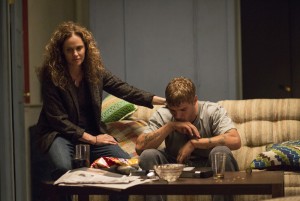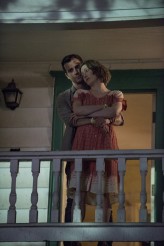
Carrie Coon as Nora Durst, Regina King as Erika Murphy in THE LEFTOVERS - Season 2 | ©2015 HBO/Van Redin
In Season 1of HBO’s THE LEFTOVERS, adapted by Damon Lindelof and Tom Perrotta from Perrotta’s novel, two percent of the world’s population has disappeared overnight. Three years later, Mapleton sheriff Kevin Garvey (Justin Theroux) is trying to keep his small town together, but it’s tough – some people are trying to move forward with their lives, while others find this offensive. A cult called the Guilty Remnant engages in increasingly shocking behaviors to upset those who they think have grown complacent, and when the Remnant goes way too far, the townspeople erupt in violent wrath.
Season 2 of THE LEFTOVERS begins Sunday, October 4, at 9 PM. Kevin and his family leave Mapleton behind for the seeming tranquility of Miracle, Texas, where no one vanished inexplicably.
Series co-creator/show runner/executive producer Lindelof is famous for making mysterious television. After all, he created LOST with J.J. Abrams and Jeffrey Lieber. Since then, he’s written the screenplays for COWBOYS & ALIENS, PROMETHEUS, STAR TREK INTO DARKNESS, WORLD WAR Z and TOMORROWLAND.
At a Q&A panel for THE LEFTOVERS hosted by HBO for the Television Critics Association, Lindelof explains more of what Season 2 will contain. “We wanted to tape Season 2 before a live studio audience,” Lindelof jokes, “and then opted for the laugh track. But in all honesty, I think that, certainly reflecting back to Tom’s book, we always want the show to feel authentic, but the first season of the show we make no apologies for. We wanted to ground the world. And to many that may have felt bleak and depressing, but to us, it kind of felt honest.
“But what was really important to us is that the characters on the show didn’t want to feel that way. And I think that, in a lot of ways – not to get all pretentious about it, but the idea of people wanting to feel better and wanting to gravitate towards ways to feel better, I think, particularly this family [the Garveys], wouldn’t want to stay in the place that they were, either geographically or emotionally. And I think when we started talking about them just sitting around a table and saying, ‘What if we left this place?’, the ideas basically started flowing. And I think it opened up the show creatively in really, really interesting new ways and obviously created the opportunity to introduce some new characters that we’re tremendously excited about.”
When the panel ends, Lindelof takes some time for more LEFTOVERS conversation.

Amy Brenneman as Laurie Garvey, Chris Zylka as Tom Garvey in THE LEFTOVERS - Season 2 | ©2015 HBO/Ryan Green
ASSIGNMENT X: Regarding the Guilty Remnant and the fury they provoke in the townspeople, you’ve said that that you could relate to the idea of running into antagonism but having the reaction be a little over the top. Were you referring to the reaction to THE LEFTOVERS or were you looking back to LOST?
DAMON LINDELOF: It does feel like that’s been the nature of my relationship with the business, which is, certainly for some people, [like] I’m just standing outside your house, smoking a cigarette, staring at you and you’re wondering why I just won’t go away [laughs]. But more importantly, you’re wondering, why am I smoking the cigarette? Why am I wearing white? Why won’t I give you the answers to the questions that you’re asking? So I’ve always related to the Guilty Remnant, because they embrace this fundamental aggressive ambiguity that I really respond to in my work.
AX: Is grief still a major theme in Season 2?
LINDELOF: We’re not abandoning by any stretch of the imagination the exploration of grief, but I think there’s a lot of different ways to look at it and hopefully we’re going to discover some new ones. But the lifeline of the show is loss and how we cope with loss and how we struggle with the mystery of loss, which is, why did this happen to me, why did it happen to the person that I loved, am I ever going to see this person again – those are all meta questions that we deal with that the show, by the nature of Tom’s premise, gets to explore in genre language. But no, we’re not giving up the grief.
AX: Are we ever going to find out what caused the mass disappearances?
LINDELOF: The show is never, ever going to reveal why this happened.
AX: Are we ever going to see anybody trying to find out?
LINDELOF: The process, the exploration of trying to determine what happened is going to be much more pervasive in the second season, but no one will be successful.
AX: Have you arced out any storylines beyond Season 2 just so you have it if HBO wants Season 3?
LINDELOF: I’ve adopted the [Vince] Gilligan model. I think a show like LOST, that was so mystery-based, it required a certain degree of planning ahead, having the answers to the mysteries, understanding that there might be some improvisation along the way, but it would have been irresponsible to proceed without a road map, even if you decided to deviate from it. THE LEFTOVERS, I’m much more comfortable saying, “We’re going to take it one episode at a time.” The collaborative nature of the show, the other writers, the directors, certainly the actors all have a fair amount of input, but we watch what they do and it inspires us. But I do think that, particularly when we told HBO that we wanted to move the show geographically in its second season, they were like, “Is this something that you’re going to do every year?” Like, “Is it going to be THE WIRE, where Season 2 is the docks and then Season 3 is Amsterdam and Season 4 is the school and Season 5 is the press?” And we essentially had to say to them, “Well, if there was a Season 3, it would probably be this.”
AX: Does it embolden you to paint yourself into a corner at the end of the season?
LINDELOF: I mean, it’s not really emboldening for emboldening’s sake. I get really excited by storytelling that’s, as you say, painting yourself into the corner. Something that I think Carlton [Cuse] used to say on LOST was, “We paint ourselves into the corner and then we walk up the wall, wait for the painting to dry and then jump down and then do it all over again.” And I think that that’s exciting, so the shows that I really gravitate to are constantly painting themselves into corners, and you say, “How are they going to up this?” or “How are they going to get out of this?” If they can’t, that’s the end of the show, but it is a very exciting way to tell stories.
AX: Do you feel like more innovative storytelling is happening on television than at the movies right now, and if so, why?
LINDELOF: I don’t know. But my guess is that there’s this pervasive feeling in the movie world of, “People say that they want original movies and it’s not true.” People actually say that they want something that feels familiar, and if you’re going to ask somebody to basically pay not just twelve or fourteen bucks for a movie ticket, but it’s got to be like a hundred bucks now for a family, or for a couple of two to go out and do dinner and a movie, so I do think there is just a metric of like, if you want someone to give you a hundred dollars, you better make it worth their while and they better have some sense of what it is they’re going to get. It’s the difference between trying a new restaurant and going to P.F. Chang’s in a lot of ways, which is, you know what you’re going to get.
In television, however, if you’re a subscriber to HBO or a subscriber to Netflix, you are paying some money, but for the most part, you’re getting all of this content for the same basic subscription fee, so I think that people are much more willing to take risks. They’re not taking money out of their pocket and also, if you don’t like the first episode of the show, then you don’t watch any more, and your investment can just be like ten minutes of that show. You can watch ten minutes of ORANGE IS THE NEW BLACK and say, “This is not for me,” or you can watch ten minutes of ORANGE IS THE NEW BLACK and basically say, “Jesus, there are three seasons of this thing, and I have seventy-two hours to watch them all.” You get to make that choice. The choice that you’re making in features is much more finite.
AX: What would you most like people to know about THE LEFTOVERS Season 2?
LINDELOF: I think that this show is interesting and emotional and authentic, despite the fact that the premise is ridiculous, and that’s my favorite kind of storytelling. J.J. [Abrams] said, when we first met on LOST, “I want to do B movie concepts in an authentic way, populated by real people.” And I feel like LEFTOVERS is in that tradition.
Follow us on Twitter at ASSIGNMENT X
Like us on Facebook at ASSIGNMENT X
Article Source: Assignment X
Article: Interview with THE LEFTOVERS co-creator Damon Lindelof on the Season 2 reboot
Related Posts:











